
Top Cybersecurity Certifications You Should Know About as a Developer
Top Cybersecurity Certifications You Should Know About as a Developer 관련

Cybersecurity remains one of the fastest-growing fields today, and for a good reason. The need for skilled cyber defenders grows as our lives and businesses go ever more digital.
A cybersecurity certification can help you boost your skills and demonstrate your value to employers. If you’re new to cybersecurity or want to specialize, here are seven top certifications to advance your career.
Certified Ethical Hacker (CEH)
The Certified Ethical Hacker (CEH) certification, from EC-Council, is a great starting point for anyone interested in ethical hacking.
CEH teaches you to think like a hacker. It helps you find and fix security flaws in systems. The course covers a range of hacking tools and techniques that attackers use.
You’ll learn how to gather information, scan networks for vulnerabilities, and exploit them. It covers system hacking, sniffing, social engineering, Denial of Service, session hijacking, malware threats, and a lot more. You can see all the topics in this screenshot from their website:
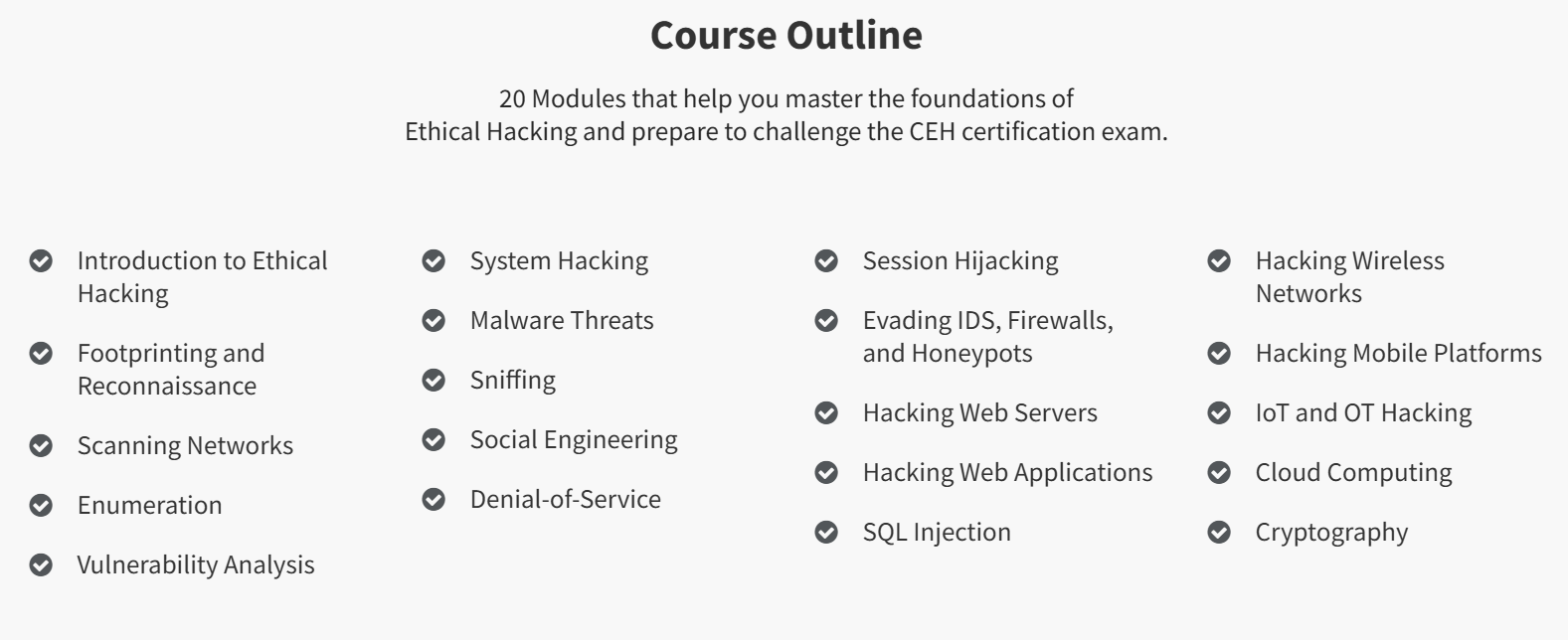
You’ll also focus on web, cloud, and wireless security to get a broad view of the most common hacking techniques and defences.
The CEH exam consists of 125 multiple-choice questions, which you have to complete within four hours. CEH is ideal for beginners and IT pros shifting to security. Costs approximately $1000. ---
CompTIA PenTest+
CompTIA’s PenTest+ cert focuses on penetration testing and vulnerability assessment. CEH gives a broad view of ethical hacking. But PenTest+ focuses on the skills needed to conduct penetration tests.
Pentest+ is a hands-on certification. It teaches you how to plan and scope a pen test, gather information on a target, and identify vulnerabilities.
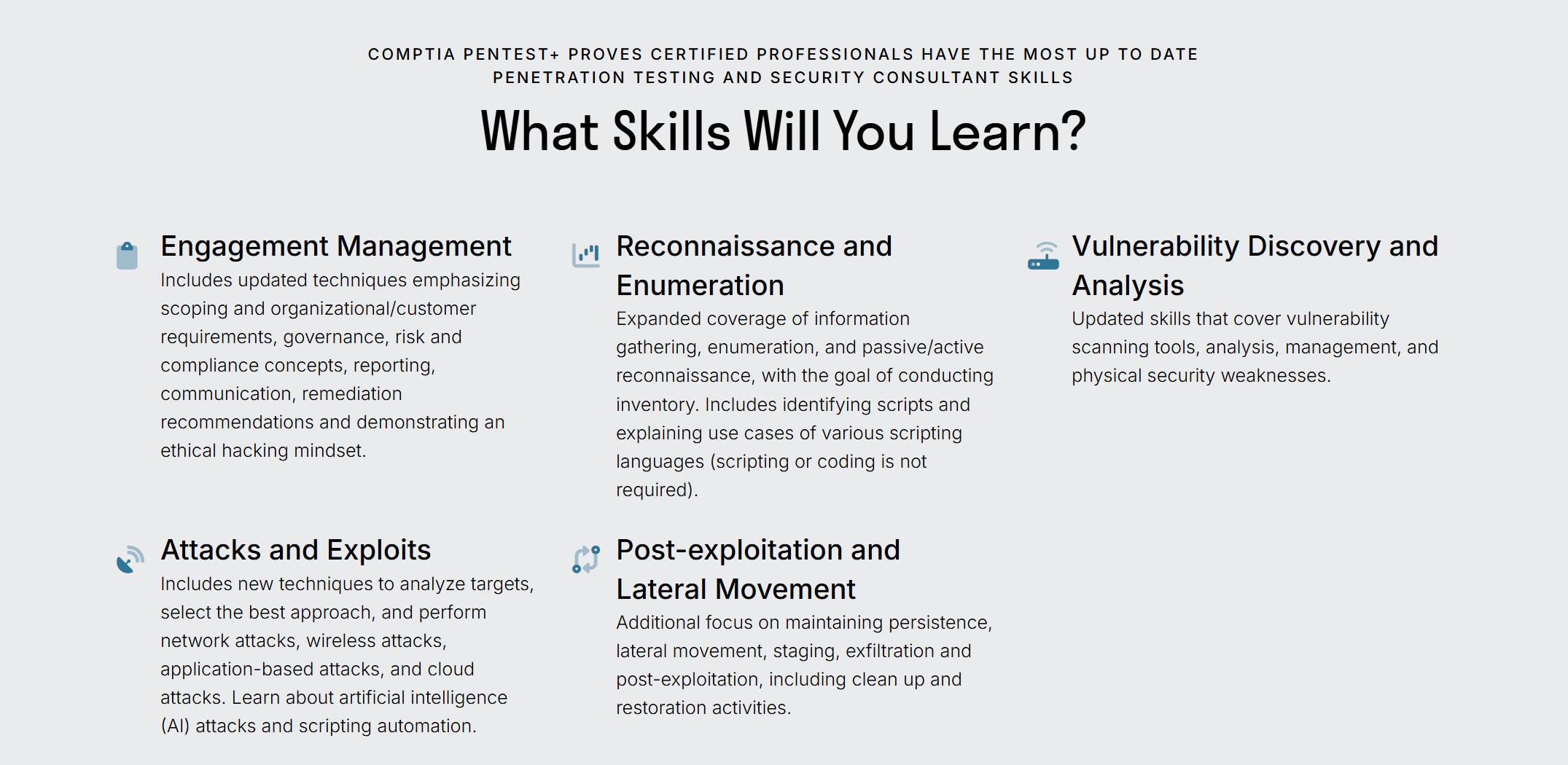
As described in the image above, the main skills you’ll learn by studying for this certification include:
- Engagement management
- Attacks and exploits
- Reconnaissance and enumeration
- Post-exploitation and lateral movement
- Vulnerability discovery and analysis
You’ll practice exploiting systems and handling post-exploitation tasks like maintaining access. The focus is on real-world pen-testing, which prepares you to assess systems thoroughly and suggest security improvements.
You must know how to plan a pen test, exploit vulnerabilities, and suggest practical security improvements to pass the Pentest+ certification.
The PenTest+ exam has multiple-choice questions and performance-based tasks. You’ll need to show practical skills, not just answer questions. CompTIA designed this certification for those with some IT or cybersecurity experience. Costs approximately $400. ---
CompTIA Cybersecurity Analyst (CySA+)
CompTIA’s CySA+ cert focuses on threat detection, analysis, and response. CySA+ is a defensive certification.
CySA+ is for professionals who want to learn how to identify and reduce threats before they cause major security incidents. You’ll learn to monitor networks, interpret data to spot suspicious activity, and respond effectively to security incidents.
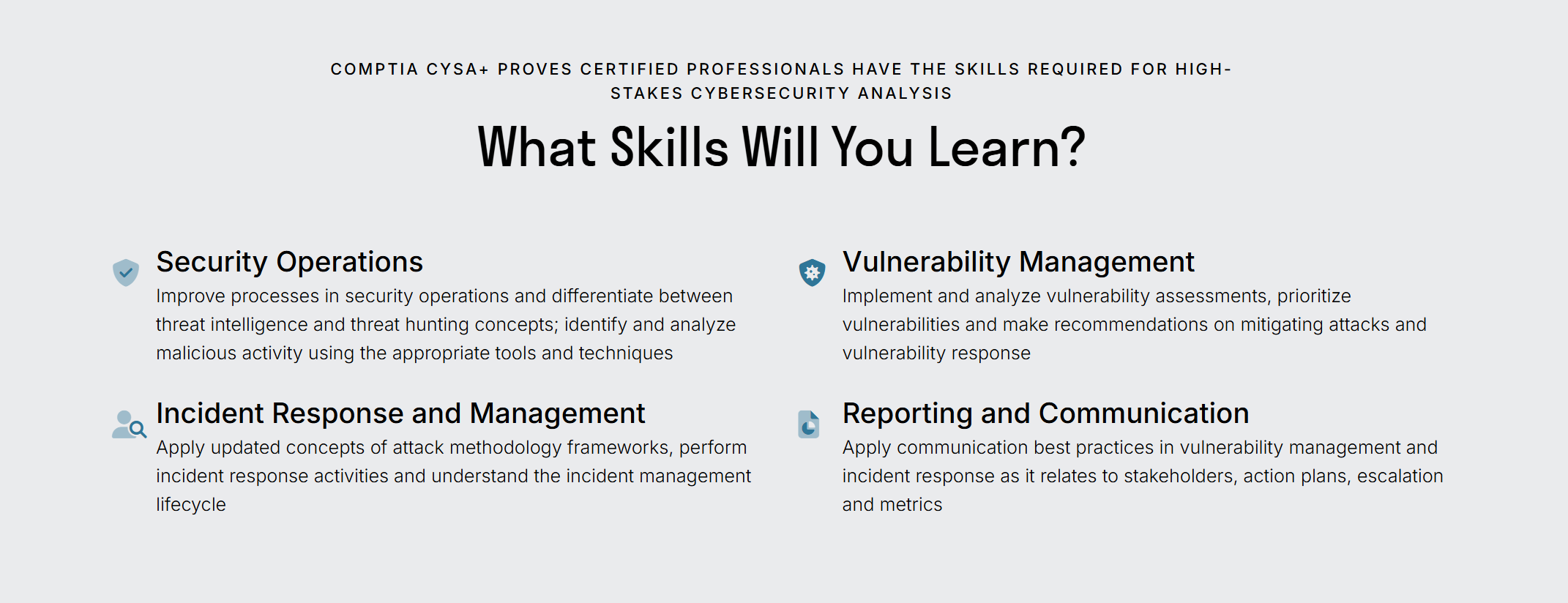
As described in the image above, the main skills you’ll learn by studying for this cert include:
- Security operations
- Incident response and management
- Vulnerability management
- Reporting and communication
CySA+ focuses on proactive threat identification and response, making it ideal for those aiming to manage security threats before they cause damage.
The CySA+ exam has performance-based questions. They test your ability to interpret data and take action. CySA+ is best for those with some IT or security experience. It costs the same as Pentest+, around $400.
Offensive Security Certified Professional (OSCP)
The OSCP certification is highly respected in cybersecurity. It is known for its tough, hands-on approach. OSCP teaches you to find, exploit, and document vulnerabilities in real-world scenarios.
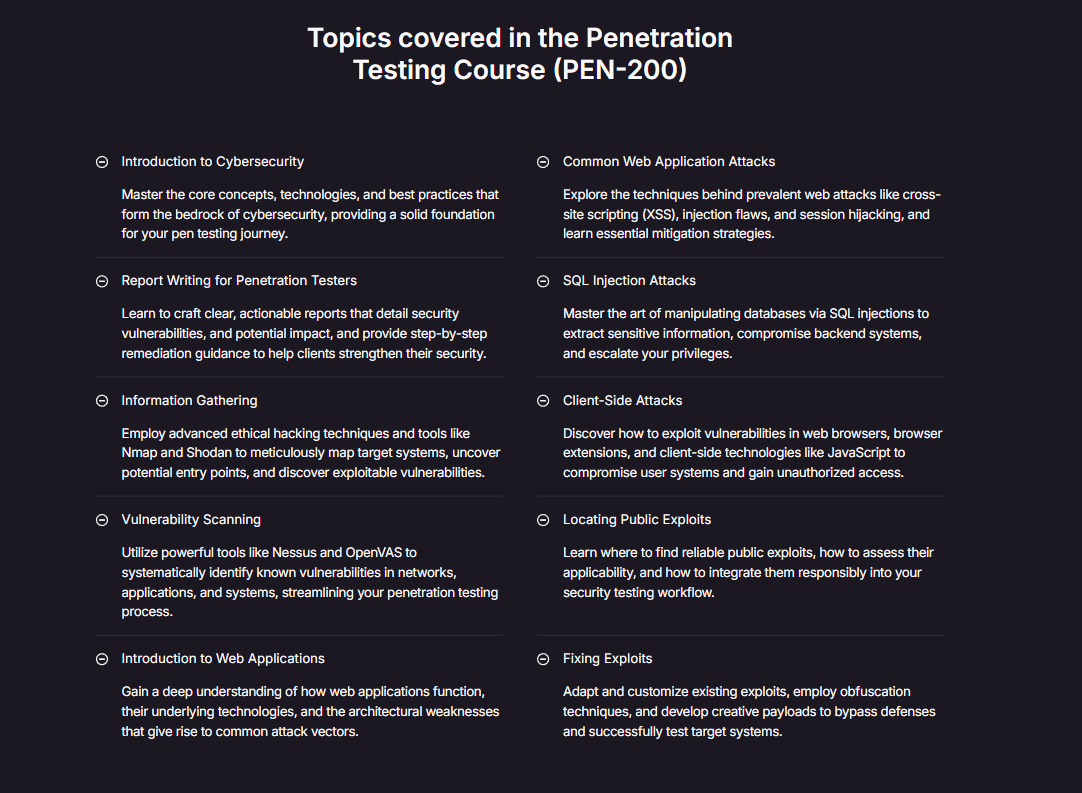
As described in the image above, the main topics covered in PEN-200 are:
- Introduction to Cybersecurity
- Report writing for Penetration Testers
- Information gathering
- Vulnerability scanning
- Introduction to web applications
- Common web application attacks
- SQL injection attacks
- Client-side attacks
- Locating public exploits
- Fixing exploits
The OSCP exam is unique. Instead of multiple-choice questions, you’ll spend 24 hours hacking into a series of virtual machines. You must document each step you take. It’s highly practical and ideal for those with pen-testing experience who want to level up their skills.
This format tests your technical skills and ability to stay organized under pressure. It’s best for those with some pen-testing experience who want to advance their skills. Costs around $1000 with one month of lab access.
Certified Information Security Manager (CISM)
The CISM certification, from ISACA, is for those seeking management roles. CISM doesn’t focus on technical skills. It focuses on managing an organization’s security strategy and aligning it with business goals.
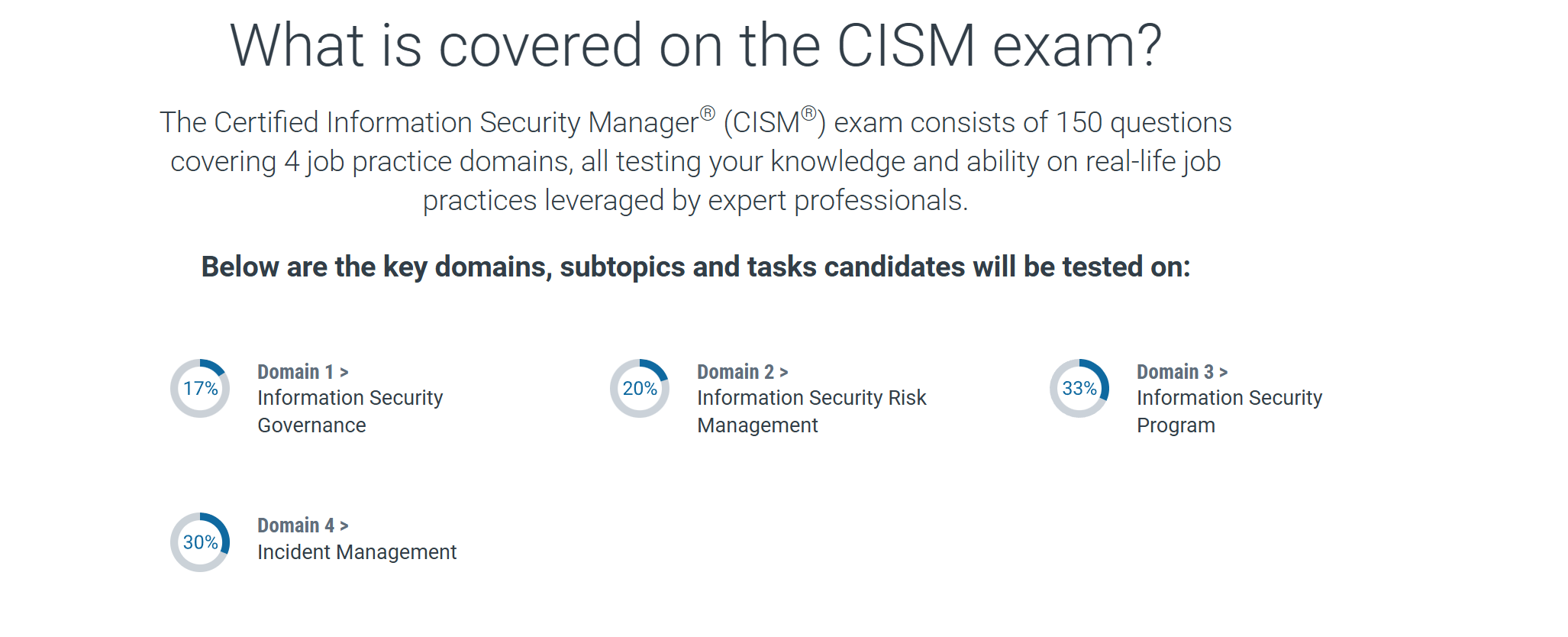
As described in the image above, the topics covered in CISM include risk management, incident response, and security policies. CISM is a great choice for those with a few years of experience in cybersecurity. It helps you move into a leadership role.
The exam consists of 150 multiple-choice questions,. It covers information risk management, information security governance, information security program development, and incident management. CISM shows you know both the tech and strategic sides of cybersecurity. Costs around $750. ---
Certified Cloud Security Professional (CCSP)
As more businesses move to the cloud, cloud security is now critical. The Certified Cloud Security Professional (CCSP) certification focuses on securing cloud environments.
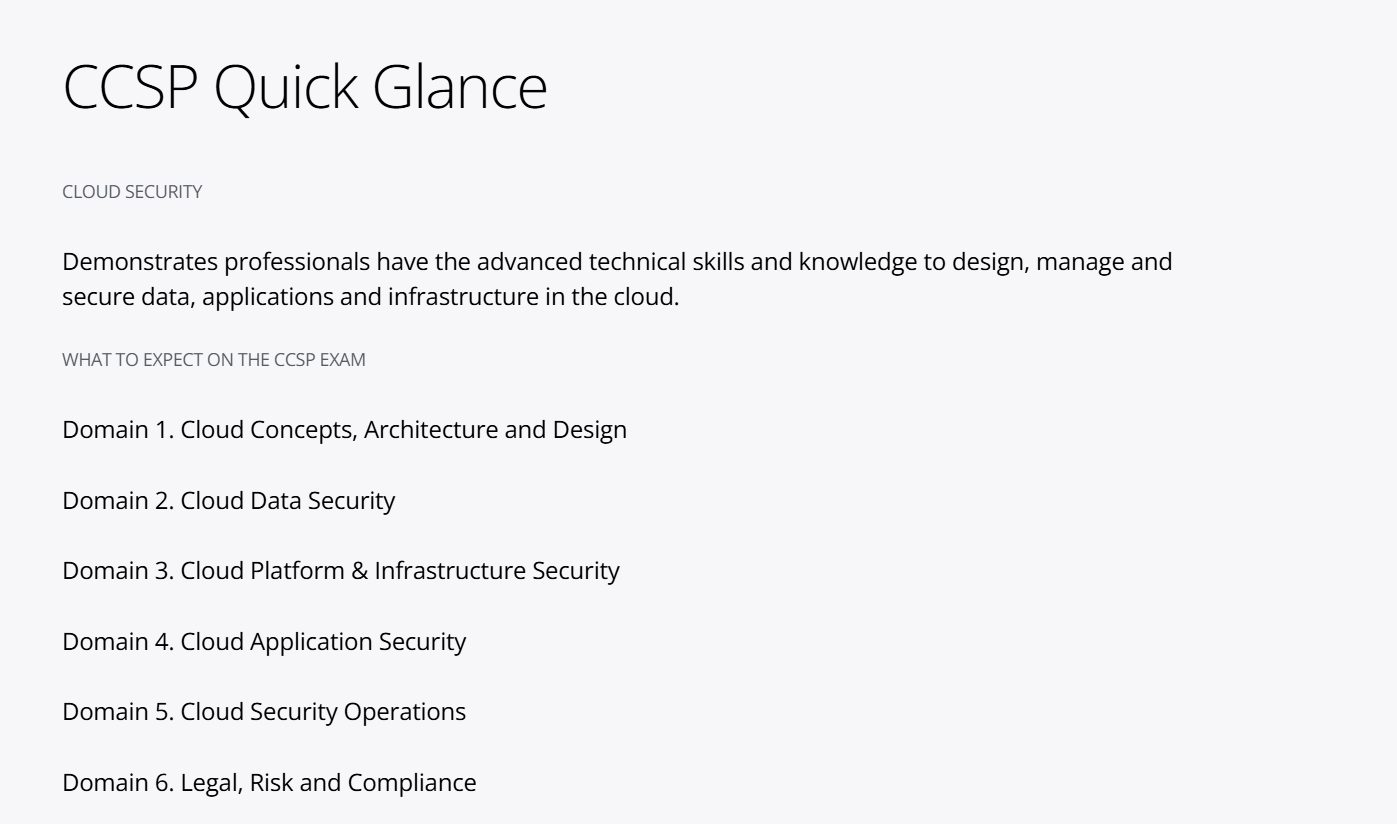
CCSP covers data security, cloud architecture, compliance, and risk management. It gives you a full understanding of how to secure cloud platforms.
The exam is organized into domains, as follows:
- Domain 1: Cloud Concepts, Architecture and Design
- Domain 2: Cloud Data Security
- Domain 3: Cloud Platform and Infrastructure Security
- Domain 4: Cloud application Security
- Domain 5: Cloud Security Operations
- Domain 6: Legal, Risk, and Compliance
This certification is ideal for IT pros working with or specializing in cloud security. The certification requires some experience in cybersecurity and cloud computing.
CCSP will prepare you for the unique security challenges of cloud environments. You’ll be a great asset to any company using cloud tech. Costs around $600. ---
Certified Information Systems Security Professional (CISSP)
The CISSP certification is highly sought after in cybersecurity. It is for experienced professionals.
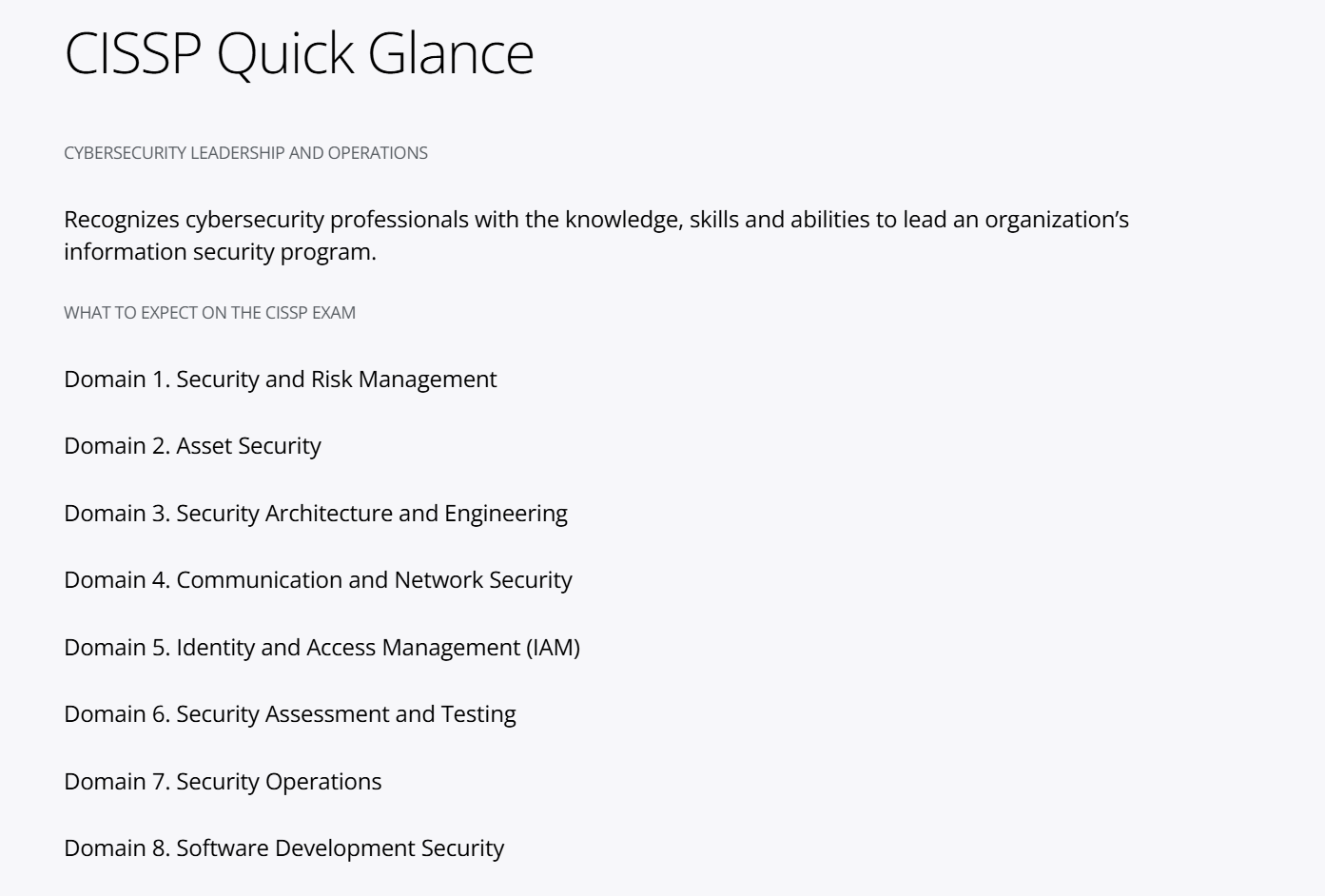
CISSP covers many security topics, and is again divided into different domains. They are as follows:
- Domain 1: Security and Risk Management
- Domain 2: Asset Security
- Domain 3: Security and Architecture Engineering
- Domain 4: Communication and Network Security
- Domain 5: Identity and Access Management (IAM)
- Domain 6: Security Assessment and Testing
- Domain 7: Security Operations
- Domain 8: Software Development Security
CISSP offers a deep, broad understanding of cybersecurity. It’s ideal for those seeking senior or leadership roles.
The CISSP exam is tough. It has 100 to 150 questions on eight security domains. It requires both technical and managerial skills. CISSP is a “gold standard” certification. It can open doors to high-level roles, like CISO or Security Director.
Which Certification Should You Choose?
The right certification depends on your experience and career goals. CEH or CySA+ can give you a solid foundation if you're just starting. If you want to specialize in pentesting, take PenTest+ or OSCP.
CCSP will prepare you for cloud security roles. For those eyeing leadership or strategic roles, CISM and CISSP provide the management-focused knowledge you’ll need.
Conclusion
Cybersecurity certifications are essential for building a strong foundation in digital defense skills. They open doors to high-demand roles and help you stay ahead in a constantly evolving field.
Hope this article helped you to understand the various certifications in the field. See you soon with another article.
Info
Join the Stealth Security newsletter for more articles on offensive and defensive cybersecurity. To learn how to hack real machines and get help from other ethical hackers, join the Hacker’s Hub.